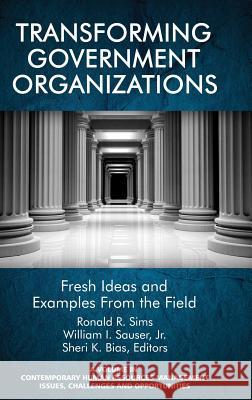Transforming Government Organizations: Fresh Ideas and Examples from the Field (HC) » książka
Transforming Government Organizations: Fresh Ideas and Examples from the Field (HC)
ISBN-13: 9781681234564 / Angielski / Twarda / 2016 / 434 str.
Transforming Government Organizations: Fresh Ideas and Examples from the Field (HC)
ISBN-13: 9781681234564 / Angielski / Twarda / 2016 / 434 str.
(netto: 415,65 VAT: 5%)
Najniższa cena z 30 dni: 432,86
ok. 30 dni roboczych.
Darmowa dostawa!
This collection of fresh contributions will add to the growing knowledge base of what does - and what does not - work when transformation efforts are attempted in government organisations. The contributors to this volume provide analyses and discussions of specific cases and issues as well as practical tools, ideas, and lessons learned.
A volume in Contemporary Human Resources ManagementIssues, Challenges and OpportunitiesIn 2010 IAP released Change (Transformation) in Government Organizations, edited by Ronald R. Sims. This well-received volume described how organizational change methods can be used effectively to make government organizations more effective and efficient and better equipped to serve a demanding citizenry. The 2010 book brought together contributions by managers, practitioners, academics, and consultants in the study of international, federal, state, and local government efforts to respond to increased calls for change (transformation) in public sector organizations.Since the release of the 2010 volume, calls for government transformation have continued and intensified, and a number of fresh ideas and examples have been generated from the field. The time is now ripe for a follow-up volume laying out innovative, successful ideas for transforming government. Transforming Government Organizations: Fresh Ideas and Examples from the Field is that follow-up volume. A collection of fresh contributions such as those included in this book will add to the growing knowledge base of what does-and what does not-work when transformation efforts are attempted in government organizations.The contributors to this new volume are experts with extensive experience as change agents in government and other organizations. They provide analyses and discussions of specific cases and issues as well as practical tools, ideas, and lessons learned intended to guide those responsible for similar efforts in the years to come. The audience for the book are government managers, scholars, and others interested in undertaking or learning about such efforts.











